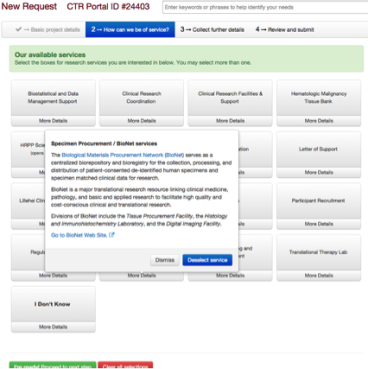In addition to histology, immunohistochemistry and digital imaging services, CTSI’s Biological Materials Procurement Network (BioNet) tissue procurement facility provides researchers with high-quality tissue procurement services in compliance with best industry practices and current regulations.
BioNet, which is part of CTSI’s Biorepository and Laboratory Services (BLS), is a University Institutional Review Board (IRB)-approved tissue procurement facility that collects biospecimen samples for research purposes from patients who have consented to have their tissue be used for research.
Since 1996, CTSI’s Biorepository and Laboratory Services BioNet has built a well-preserved archive of tissues available to interested researchers, including malignant and benign tumors, other diseased tissues. In some of these cases the archives also include organ-matched normal tissue, blood and urine samples, saliva, or ascites fluid.

In 2014 BioNet joined CTSI to enhance its platform of research services and resources. It has partnerships and collaborative relationships with the Department of Laboratory Medicine and Pathology, Fairview Administration and Research Operations, the University’s Advanced Research and Diagnostic Laboratory (ARDL), and the University’s IRB Administration.
Managing the entire collection
The entire collection process of procurement and archiving of biospecimens -- from obtaining patient consent and sample collection in the Operating Room to proper handling, manipulation, and storage of the specimens -- is managed by BioNet to ensure compliance with best industry practices and current regulations.
"BioNet has the regulatory approval to prospectively store the specimens and associated annotation data, and also can report the de-identified data to the researcher," said Carla Heinke, MS, BioNet Manager. "Since BioNet staff work closely with the IRB office, we provide peace-of-mind to researchers."
In 2003, Heinke established the National Marrow Donor Program’s Minnesota biorepository and continued to manage it for 10 years. The NMDP now includes 10 million samples and four major business units.
Procuring tissue for translational research
BioNet also is able to procure tissues from small laboratory animals, a unique benefit for researchers on the Twin Cities campus.
"This is especially helpful for researchers interested in translational research -- who might be piloting a clinical trial that looks to identify direct comparisons from animal to human research,” said BioNet Medical Director Bartosz Grzywacz, MD.
Additionally, a new grossing station, which enhances the ability to procure small lab animal tissue and specimens, was recently installed.
BLS’s BioNet, an Internal and External Service Organization (ISO and ESO, respectively), recently established a contract with the Mayo Clinic for histology work on canine heart specimens.

Providing multiple services
In addition to tissue procurement, BioNet offers histology and immunohistochemistry, and digital imaging services to University and business and industry researchers who are working to develop new technologies and products. Its histology lab processes nearly 2,000 tissue blocks and 13,000 slides each year.
"Our digital imaging services are especially helpful for junior investigators who may not be as adept at reading stains and slides or operating microscopes and slide scanning equipment," said BioNet Technician Beth Getzel.
"Every day we engage researchers to help them navigate the research process, develop protocols, attain IRB forms and approvals. We welcome inquiries from researchers," Heinke said.
For more information about the BLS’s BioNet, its services, and its reduced costs for University researchers, contact Heinke or the technicians, even after hours via a pager, at 612-273-6680 or [email protected].